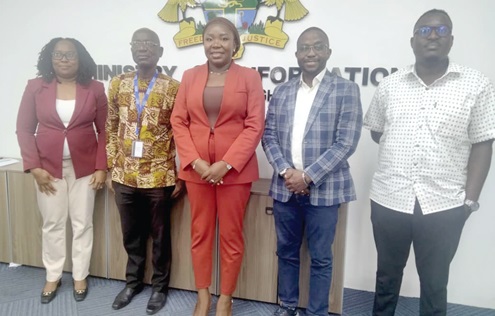
Let’s revive Presidential media encounters — Gt. Accra GJA Chairman
The Chairman of the Greater Accra Chapter of the Ghana Journalists Association (GJA), Charles Benoni Okine, has appealed to the Minister of Information, Fatimatu Abubakar, to help to revive the Presidential Media Encounters.
The move, he said, would help bridge the information gap between the media and the presidency, while fostering a more transparent and accountable government. “As media personnel, we want to have direct engagements with the President as is the case elsewhere and, therefore, we will want to use your good offices to channel our appeal to the President for consideration,” Mr Okine said when he led the leadership of the regional chapter to pay a courtesy call on the Minister of Information.
Other members of the delegation were, the Vice-chairman of the regional chapter of the association, Norman Cooper, and acting Treasurer, Kester Aburam Korankye.
Mr Okine emphasised the importance of direct communication between the Presidency and the media, saying “it helps to clear misconceptions and offers the President to clarify major issues of national concern”.
“Let us not forget that, Ghana has a good image out there and therefore, such regular interactions with our President will further boost our image as a shining example of democracy in the sub-region, the continent and even globally”.
The call comes at a time when the Presidential Media Encounters have stalled, a development which has prevented the media from seeking high profile clarifications on major government policies and programmes.
Mr Okine said reinstating that series would not only benefit the media but also enhance the country's democratic credentials. He said regular interactions between the President and the press would promote a more informed public and strengthen the relationship between the government and the media.
Training
Mr Okine also raised the issue of continuous training for journalists and other media practitioners, highlighting the need for many of such opportunities, particularly on ethics, and suggested a two-week crash programme for young journalists to be done in partnership with the Institute of Journalism of the University of Media, Arts and Communication (UniMac-IJ).
“We want our members to be abreast of the essence of adhering to ethics of the profession and also the need to be guided by what helps to avoid misinformation and disinformation,” he added.
The regional chairman expressed concern over the rising trend of misinformation and disinformation, urging institutions of state to be more forthcoming with information to clarify issues when approached by journalists.
Mr Okine commended the Right to Information (RTI) Commission for its prompt assistance that enabled journalists to access information, but stressed that the condition should not exist for the RTI to become the sole means of obtaining crucial information in the interest of the public.
He said the association remains committed to promoting excellence in journalism and fostering a collaborative relationship between the media and government institutions.
Abuse
Mr Okine bemoaned the abuse of journalists in the performance of their duties, especially by some police officers, and called for protection of journalists as the country got closer to the December elections.
Pledges
Ms Abubakar acknowledged the importance of such Presidential encounters and hinted of measures underway to revive it. She said there were already discussions underway at the presidency to bring back the series to enhance government communications.
Ms Abubakar also announced a hybrid training programme for journalists, focusing on ethics and media law, to be conducted both online and offline. She also assured the association of the government’s commitment to the welfare of journalists, adding that training programmes for journalists were in the pipeline.
